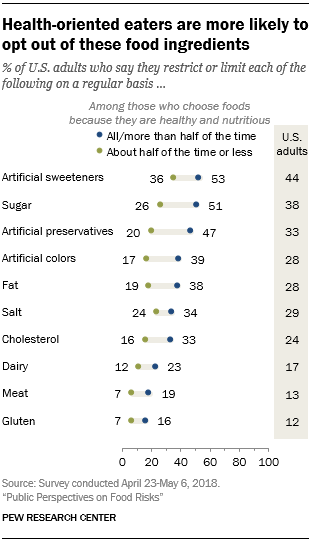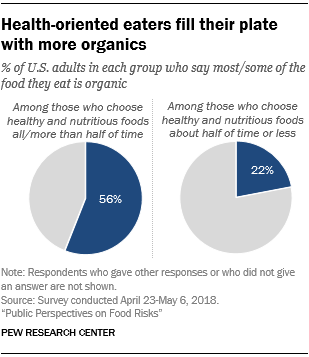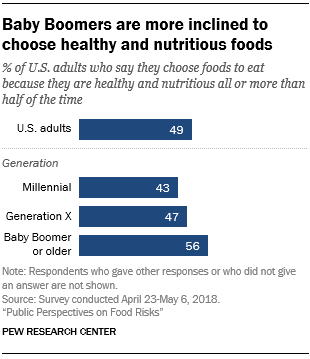The United States is a nation divided when it comes to food. About half of U.S. adults (49%) are “health-oriented eaters” who say that they choose foods all or more than half the time because they are healthy and nutritious. The other half (51%) are less focused on healthy foods, saying they select foods because of their health and nutritional value about half the time or less, according to a recent Pew Research Center survey.
 Americans’ food preferences are especially evident in what they don’t eat. When asked how frequently they limit consumption of foods (based on a list of 10 items), those who choose foods because they are healthy and nutritious ruled out, on average, 3.5 ingredients. By contrast, people less health-oriented in their eating restrict an average of only 1.8 of these ingredients from their diets.
Americans’ food preferences are especially evident in what they don’t eat. When asked how frequently they limit consumption of foods (based on a list of 10 items), those who choose foods because they are healthy and nutritious ruled out, on average, 3.5 ingredients. By contrast, people less health-oriented in their eating restrict an average of only 1.8 of these ingredients from their diets.
About half of health-conscious eaters say they limit their intake of artificial sweeteners (53%), compared with 36% of the less health-oriented. Similarly, health-oriented eaters are more likely than their less health-conscious counterparts to limit consumption of sugar (51% vs. 26%), artificial preservatives (47% vs. 20%) and a host of other ingredients that includes artificial coloring, dairy and gluten.
 Health-oriented eaters also report eating larger shares of organic foods, which by design exclude certain food ingredients, including artificial preservatives, flavors and colors, as well as genetically modified ingredients. A slight majority (56%) of health-oriented eaters say most or some of what they eat is organic, compared with 22% of those who are less health-oriented.
Health-oriented eaters also report eating larger shares of organic foods, which by design exclude certain food ingredients, including artificial preservatives, flavors and colors, as well as genetically modified ingredients. A slight majority (56%) of health-oriented eaters say most or some of what they eat is organic, compared with 22% of those who are less health-oriented.
 Who comprises the ranks of these health-oriented eaters? They are more likely to be Baby Boomers than Millennials. Some 56% of those in the Baby Boomer or older generations say they pick foods because they are healthy and nutritious at least more than half of the time, compared with 43% of Millennials.
Who comprises the ranks of these health-oriented eaters? They are more likely to be Baby Boomers than Millennials. Some 56% of those in the Baby Boomer or older generations say they pick foods because they are healthy and nutritious at least more than half of the time, compared with 43% of Millennials.
Americans with higher family incomes also stand out as more likely to make health-oriented food choices. Among those whose family income is $100,000 or higher, 58% say they choose foods based on health and nutrition more than half of the time or always, compared with 45% of those with incomes less than $30,000. And larger shares of women than men are health-oriented eaters (52% vs. 45%).



